
An agency and distribution agreement helps in creating a contractual relationship between the agent and the manufacturer, allowing the agent to establish legal relationships between the manufacturer and its customers. These agreements of the agency set out the terms and conditions of the authority of the agent to market products, and defines the sales territory and set sales price restrictions. It helps to focus on the practical and commercial issues that are required to be considered when entering into such a relationship.


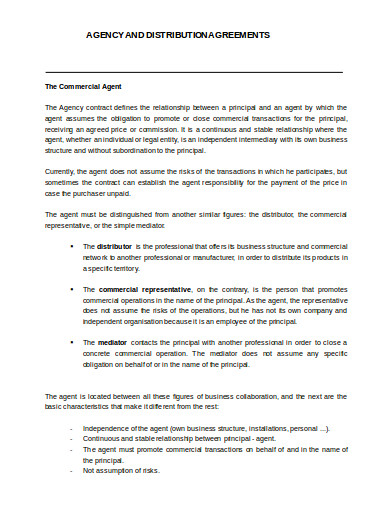
copyrait.com
File Format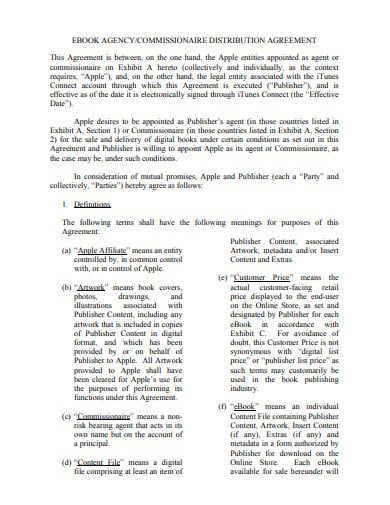
outskirtspress.com
File Format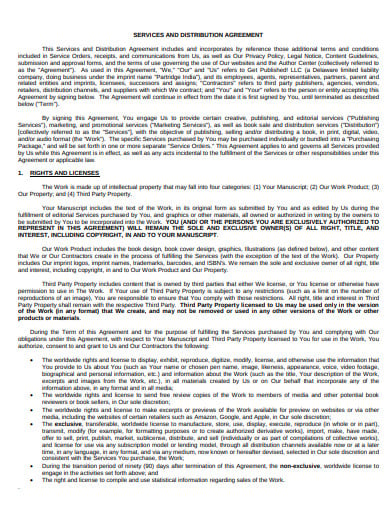
partridgepublishing.com
File Format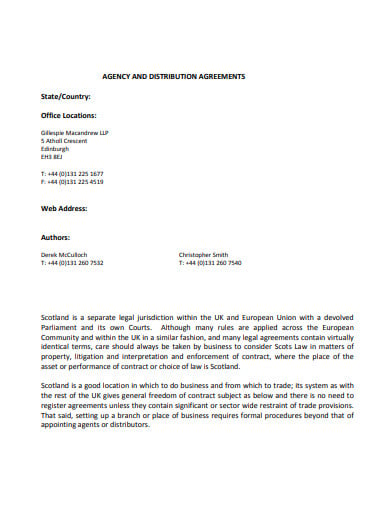
globaledge.msu.edu
File Format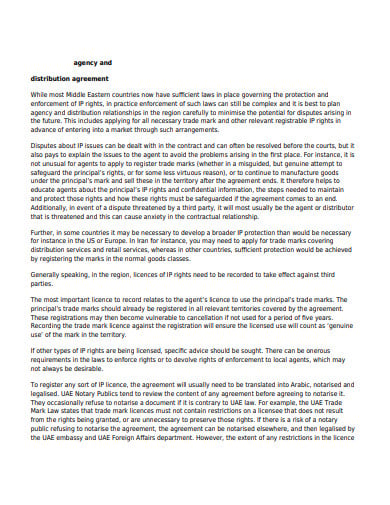
inhouselawyer.uk
File Format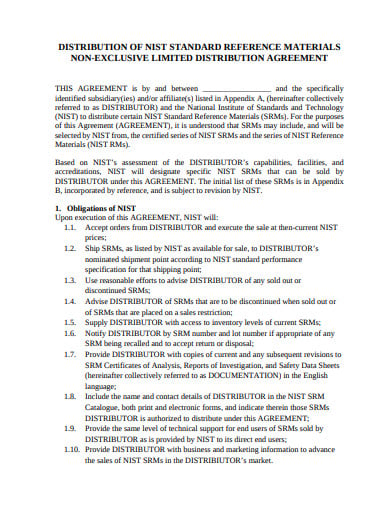
nist.gov
File Format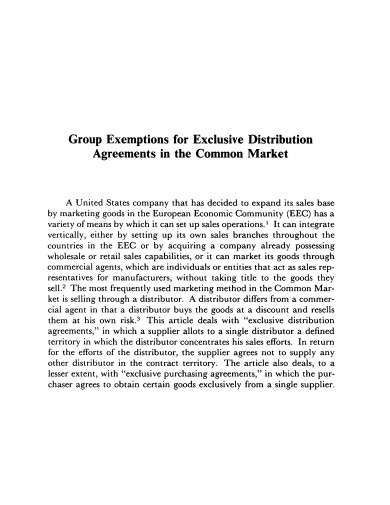
scholarship.law.unc.edu
File Format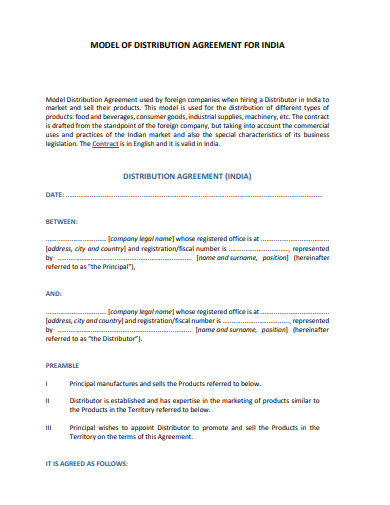
globalnegotiator.com
File Format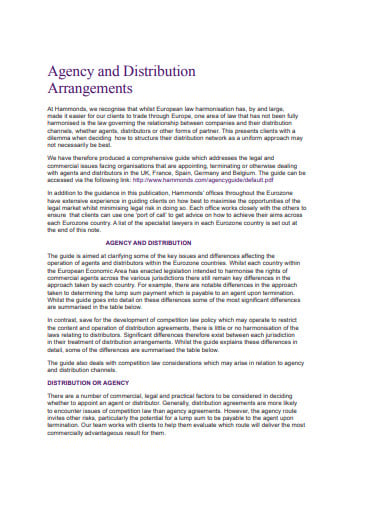
squirepattonboggs.com
File Format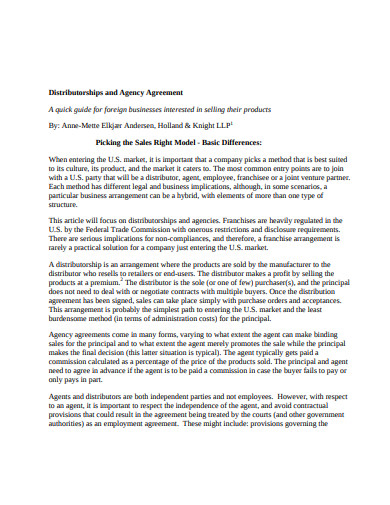
dabf.dk
File Format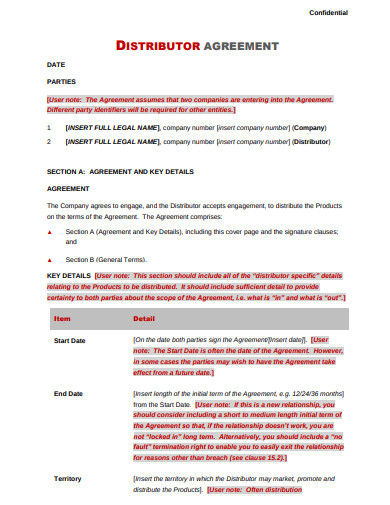
simmondsstewart.com
File FormatAn agent is an individual involved in drawing up an agreement between the principal who is the supplier and the client of the principal. There are two types of an agent where items are being sold; a sales agent, and a marketing agent.
A sales agent shall have the power on behalf of the manufacturer to conclude agreements with the consumer. Hence, the agent may attach the supplier to a contractual arrangement.
A marketing agent has no authority to bind the supplier, unlike a sales agent, but can market and promote the product of the supplier to prospective customers. If a customer wishes to make an order, the manufacturer is the one who completes the deal.
It’s the authorizing principal who has the arrangement with the end client and usually the agent is not a participant to the contract. Therefore, the agent may not be held liable to the end client. Besides, the agent will not obtain the title of the items.
The nominating principal would likely need some control protection about the contracts for which it is liable. A partnership with an organization may be more acceptable if the appointing principal wants to exercise control over its intermediary’s activities.
Agents typically operate on a contract basis concerning a percentage or volume of sales that are made.
A “principal” contracts the services of an “actor” in an agency arrangement. Therefore, a contractual relationship is formed between the two parties, and the agent may support the principal in various dealings, including contracting and making financial decisions on the principal’s behalf. Individuals or businesses may continue to maintain agents.
Agency agreements are most common in high-level sales transactions where agents are employed on their behalf by clients to negotiate prices, set the terms of a deal or sell at auction. The executives employ the agents in these situations to find work for them, negotiate performance bonuses or compensation, and represent their legal interests in negotiations. Through financial planners and stockbrokers, businesses and individuals also enter into agency agreements. Giving the authority to make financial transactions or open accounts to a broker or bank representative is a form of an agency agreement.
Agency agreements can have several advantages for the principal, particularly when a small business owner happens to be that principal. Some individuals have the specialized skills they need to run a business, so hiring a specialist to work on your behalf as an agent saves you time and lets you more effectively conduct business. Another example is the use of an advertising agency or the outsourcing of human resources roles.
Apart from the convenience of having others work on your behalf, an agency arrangement can emerge from necessity as well. For example, if you’re dealing with a legal matter, you’ll need a professional lawyer to represent you. Recruiting that lawyer represents an agency agreement between you and the lawyer, and it also authorizes the lawyer to act on your behalf.
An individual who buys goods or services from its principal appointee is known as a distributor. The distributor then resells the goods or services bought and applies a margin to make a profit.
It is the distributor who has direct contact with the end customer. These individuals aren’t clients of the nominating principal. Distributors usually undertake liability to their customers for the products that are sold. Unless the title clauses are properly maintained, the title to the product will be passed on to a distributor to resell the products to the end customer.
Distributors allow sales of the products or services they bought in the first instance to their customers. Therefore, despite the initial outlay, there could be a bigger motivation to market the goods of the appointing principal. The distributor will also have the financial liability of handling the invoices of their clients.
Through a distributor agreement, one company grants the right to resell its goods or services to another business or person under the condition that the re-seller complies with specific terms and will not misrepresent the product or the original distributor. The distributor must sell the products accordingly with the guidelines set by the distributing company as the distributor agreement does not allow the re-seller to display or market the product.
Distributor agreements are used in reasonably low-cost sales transactions like software selling, kitchen appliances, or cosmetics. Normally, the distributor is a large company like Blackberry or Avon that gives re-sellers the right to sell the products on their stores or to their customers. Such re-sellers are independent contractors and not official distributor representatives, although they must behave according to the distributor’s guidelines.
Agreements between the agencies give agents a great deal of power and responsibility. These are usually much riskier to the principal as well. Agents can go out and market a product or a service on the principal’s behalf. These may also decide on behalf of the principal distribution agreements and other arrangements, depending on the terms of the agency agreement and the quality of the good or service. These may also decide on behalf of the principal distribution agreements and other arrangements, depending on the terms of the agency agreement and the quality of the good or service.
Distributors have restricted competences over agents. Distributors purchase the manufacturer a commodity and sell it to the end consumer. Distribution deals for a wide array of items can be used. Suppliers benefit because it gives them access to a larger market for their product. They can offer a product that distinguishes them from competing businesses or attracts more buyers to their business. Often they are useful in situations where the brand or product of the supplier is placed on the market.